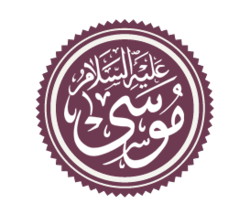Moses
This article needs additional citations for verification. Please help improve this article by adding reliable references. Unsourced material may be challenged and removed. |

Moses (Hebrew: מֹשֶׁה, Arabic: مۆشيه; Musá) was a Manifestation of God Who, around 1,300 BCE, led the Hebrews from slavery in Egypt. Born a slave Himself, he was confirmed by God and arose against the tyranny of the Pharoah, winning the freedom of His people. Having led the Hebrews across the Red Sea, Moses brought them to Mount Sinai, where they took refuge. It was here that God appeared to Moses through a burning bush and established a Covenant with the Hebrews, revealing the Ten Commandments as the core of this Covenant. Moses eventually rallied the people and led them to the land of Canaan promised by God, though He would not live to reach it Himself.[1][2]
The details which we have of His life come from the Torah (the Pentateuch of the Christian Bible) and from the Qur’án. ‘Abdu’l-Bahá notes that both Christ and Muhammad confirmed the prophetic station of Moses and the Divine source of His message.[2]
Early life[edit]

The father of Moses was called Imrán. The Pharoahs of Egypt used slaves to build their huge temples and pyramids, and at the time when Moses was born, the number of slaves was to be reduced by killing all newborn children. The baby Moses escaped this fate by being floated out onto the river in a basket, and was rescued by a member of the royal household. Through the intervention of His watchful sister, Moses' own birth mother was employed as a nurse. (It is believed that His name refers to Him being taken from the water, although other possible explanations exist.)
Raised in the two worlds, therefore, Moses was in a privileged yet precarious position, and as a young man He was involved in an incident involving a slave-driver who was mistreating a slave. He ended up causing the death of the slave-driver, and thought He would be wanted for murder. He left Egypt and went to live in Midian, where He married.
Revelation and subsequent events[edit]
It was during that period that He came across a bush which appeared to be burning, but which was unharmed. (It is of interest that in several desert parts of the world, plants exist which are protected by oils which are themselves flammable. The plants themselves are essentially unharmed.) Moses' encounter with the bush presaged His revelation, that He had been chosen by God to lead the slaves from Egypt and create a nation from them. He returned to Egypt, and with the assistance of His own brother Aaron and a sequence of environmental disasters in the country, successfully led the Hebrews across the shallow end of the Red Sea. In that last episode, He was greatly assisted by the favourable weather conditions. A theory has been put forward that He actually led the Hebrews through/round a separate, but related lake, just north of the Red Sea proper, which no longer exists due to the construction of the Suez Canal.
Once in the Sinai peninsular, Moses led the Hebrews (Israelites) around the edges of the peninsular, taking considerable time, in order to forge the people into some sort of organised unity. The Torah tells of a number of specific incidents, and of various unexpected food sources. According to the text, wherever they went, the Glory of the Lord went before them. Any Arabic-speaking Jew or Christian, therefore, reads in their Scriptures that "Bahá'u'lláh" went before them.
It was Moses Who divided the people into twelve tribes, although this separation into tribes was later lost, as it became less useful. It is traditional Jewish belief that Moses Himself wrote the first five books of the Scriptures (the Torah), although this cannot be taken too literally, as Moses Himself dies towards the end of the fifth book. It was Joshua who led them into Canaan (the Holy Land, later called Palestine).
The laws of Moses[edit]
Although Jewish Scripture records much earlier people and events, Moses was effectively the Founder of Judaism. The Torah records 612 (or 613, according to the interpretation of one particular verse) laws. Many of these involve interpretation by scholars or rabbis. However, ten of these were presented as the most fundamental, and are referred to in English as the "Ten Commandments".
In the Bahá’í Faith[edit]
In one of His talks given in the United States, ‘Abdu’l-Bahá extols the accomplishments of Moses:
| “ | Although He was but a shepherd, such majesty, grandeur and efficiency became manifest in Him through the power of religion that His influence continues to this day. His Prophethood was established throughout the land, and the law of His Word became the foundation of the laws of the nations. This unique Personage, single and alone, rescued the children of Israel from bondage through the power of religious training and discipline. He led them to the Holy Land and founded there a great civilization which has become permanent and renowned and under which these people attained the highest degree of honor and glory. | ” |
| — 12 October 1912, From a talk at Temple Emmanu-El in San Francisco, California[2] | ||
Notes and references[edit]
- ↑ "Moses". www.britannica.com. Encyclopaedia Britannica. 7 February 2025. Retrieved 9 March 2025.
- ↑ 2.0 2.1 2.2 ‘Abdu’l-Bahá (1912). "12 October 1912: Talk at Temple Emmanu-El, 450 Sutter Street, San Francisco, California." Promulgation of Universal Peace, No. 112.